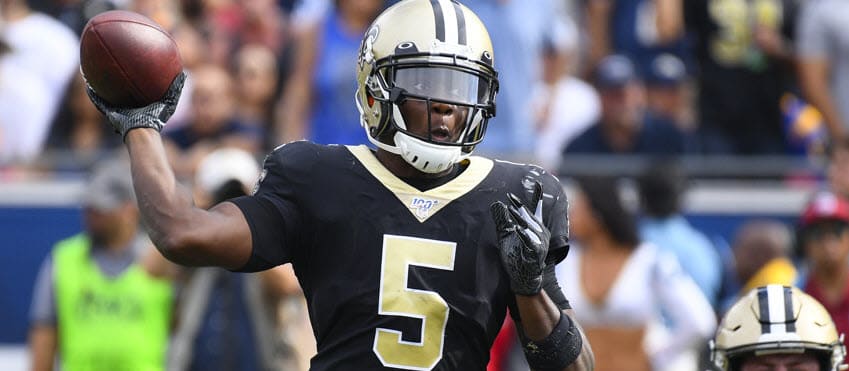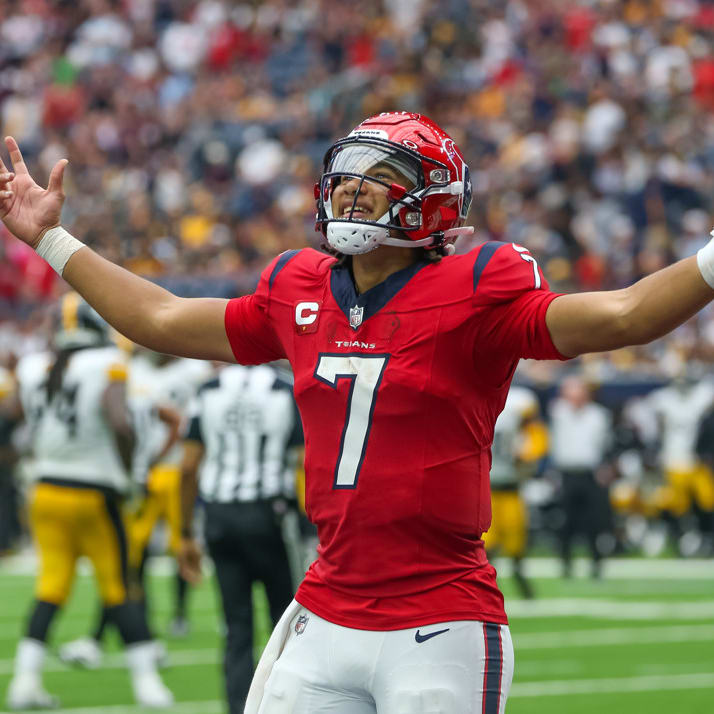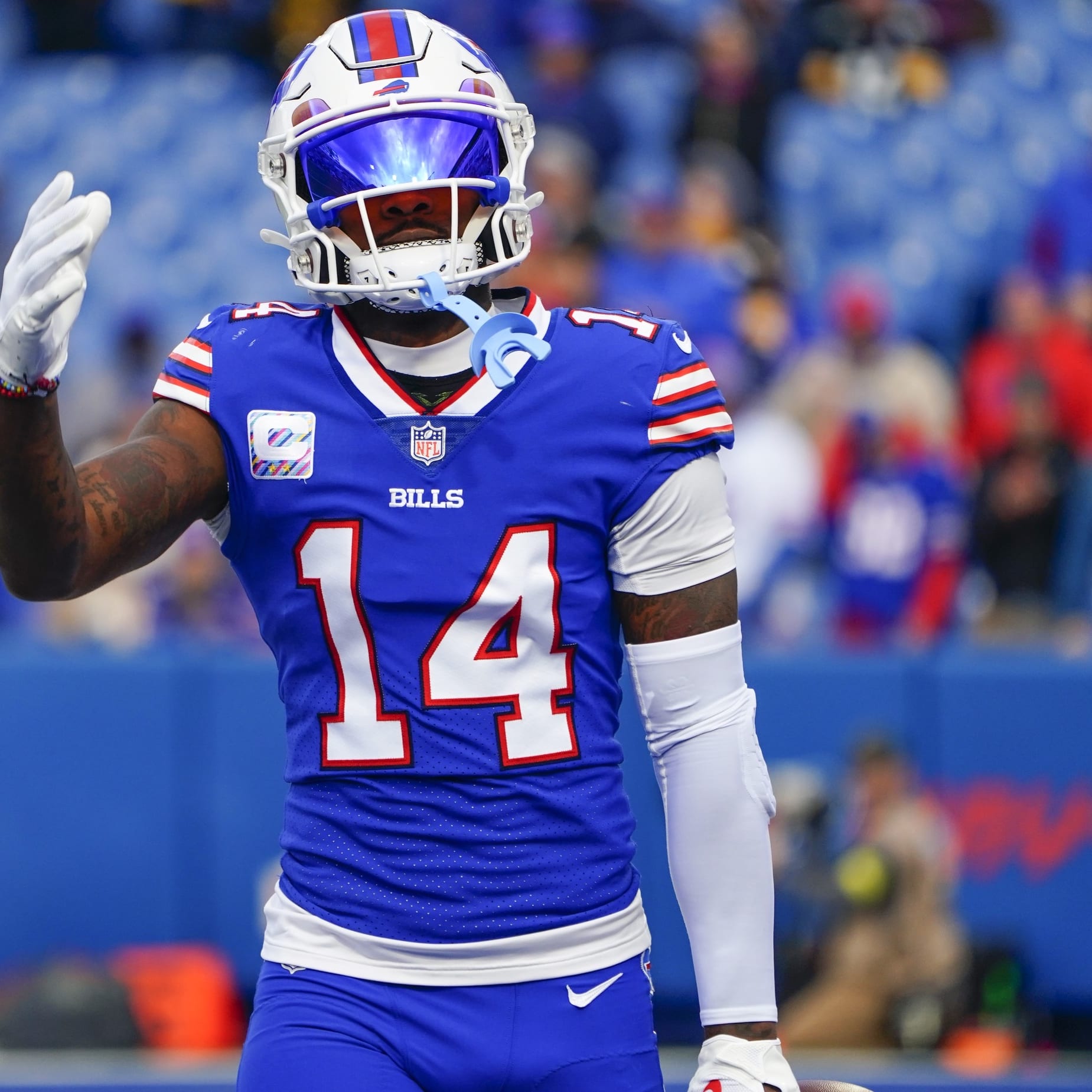This article is part of our NFL Free Agency series.
By definition, the word 'guaranteed' is unambiguous, or at least it was until it met its match in football media mumbo-jumbo talk. We now live in a world where NFL reporters specify "fully guaranteed" when they want to convey that a portion of a contract is actually guaranteed, whereas the word 'guaranteed' on its own is more along the lines of kinda-sorta-maybe-probably.
Reporters rely on agents to provide news scoops, with both parties standing to benefit from making the contracts sound as lucrative as possible. In addition to helping the agent's reputation — and thus his/her ability to recruit new clients — a bigger number is more likely to generate clicks, likes, retweets and comments for the reporter.
Eventually, fans and beat reporters realized it wasn't all that helpful to see contract terms that only show the number of years and presumed total value. After all, how many times have we seen a guy get released after playing out just one or two seasons of a "five-year, $40 million" contract?
In response, many reporters started to include guarantees in their contract tweets, giving the people what we demanded... at least for a time. The new norm was a report that looked something like this:
And there you have it: Suh will sign with the Dolphins on Tuesday, reports Chris Mortensen. Around $114 million and $60 M guaranteed.
— Barry Jackson (@flasportsbuzz) March 8, 2015
Suh made it through only three of the six seasons written into his contract, but he did indeed collect the $60 million, which truly was guaranteed, i.e., the only way he could miss out on it was by retiring before Year 3 or doing something outrageous to trigger a morals clause. Here's a tweet from three years later, after the Dolphins cut Suh:
Upon his release, Ndamukong Suh will have pocketed ~$60 million over three years from the Dolphins. That was the fully guaranteed portion of the six-year, $114.4 million deal.
— Mike Garafolo (@MikeGarafolo) March 12, 2018
Now, let's take a look at the way a more recent contract was reported, namely Paul Richardson's deal with Washington two years ago:
Former #Seahawks WR Paul Richardson is expected to sign with Washington, per @MikeGarafolo
A 5-year deal worth $40 million, with $20 million guaranteed.
— Dov Kleiman (@NFL_DovKleiman) March 13, 2018
The tweet says "$20 million guaranteed", but that's not really accurate unless we're in the business of redefining words. Fortunately, a Washington beat reporter hopped in a few days later to describe how the Richardson contract actually worked:
Contract details for new #Redskins WR Paul Richardson, per league source: $12.5 fully guaranteed right now. $16.5M if he's on roster 5th day of league year in 2019. $20M guaranteed for injury only
— JP Finlay (@JPFinlayNBCS) March 16, 2018
Fast-forward to two years later... Richardson was released in February, with OverTheCap.com showing that he was paid $16.6 million for his two seasons in Washington. It seems like "guaranteed" wasn't really the correct word to describe that $20 million, huh?
Of course, Richardson's agent still got some good publicity for scoring "$20 million guaranteed" for a guy with 1,302 receiving yards in 47 games, and the reporter put himself in good position to score future scoops from said agent.
Contracts are a decent gauge of how players are viewed by both their current team and the market at large, but we'd be often be operating on faulty information if we took initial reports at their word. One might assume that a big contract in March equates to a key role in September, and while that often turns out to be the case, it's also true that some of those "big contracts" aren't actually too impressive.
Our goal here, with the help of information from OverTheCap.com, is to break down some of the recent contracts for any details that might be useful to fantasy owners. This is especially important in dynasty leagues, but there's also some stuff that should have relevance for season-long formats, DFS, etc.
Quarterbacks
Teddy Bridgewater,  Carolina Panthers
Carolina Panthers
Initial Report: Three years, $63 million
Details: NFL.com's Albert Breer reports the contract includes $33 million guaranteed, comprised of a $15 million signing bonus, $8 million base salary for 2020 and $10 million out of Bridgewater's $17 million base salary for 2021.
Impact: I'm surprised by the strength of his contract from Bridgewater's perspective. Essentially, the Panthers can pay him $33 million for one season, $40 million for two seasons or $60 million for three years (he also has another $1 million available each year in per-game roster bonuses and workout bonuses). I was expecting the contract to have weaker guarantees to give the Panthers an easy out after one year. Instead, this structure suggests GM Marty Hurney believes there's a pretty good chance Bridgewater will be the answer at QB, and it also shows how the market for Bridgewater was far stronger than that for Marcus Mariota ($7.5 million guaranteed) or Case Keenum ($8 million guaranteed), not to mention Jameis Winston (still unsigned!).
Marcus Mariota,  Oakland Raiders
Oakland Raiders
Initial Report: Two years, $17.6 million, with $7.5 million guaranteed.
Details: The initial report is accurate, but it's important to note that the guarantee is solely comprised of the 2020 base salary. Mariota then has a non-guaranteed salary for 2021, so this is essentially a one-year, $7.5 million contract that includes a $10.1 million team option for a second season. However, it also includes a bunch of incentives, creating a maximum value of $37.5 million — a number that he won't actually come close to unless he's the regular starter for the next two seasons and puts up big numbers while the Raiders win a bunch of games (Ha!).
Impact: This contract puts Mariota at the very high end of backup territory rather than low-end starter ranger. The Raiders are paying a bunch of money to have the option of evaluating Mariota in 2020 and/or 2021 if they decide they're fed up with Derek Carr, whose contract contains $2.9 million guaranteed for 2020 and no guarantees thereafter. Carr won't necessarily face competition for the Week 1 job, but he'll likely be benched if he doesn't play well in the regular season.
Nick Foles,  Chicago Bears
Chicago Bears
Initial Report: Agrees to a restructure that maintains the final three years and $21 million guaranteed from his original Jacksonville contract.
Details: I've seen slightly different numbers for this complicated contract from various media outlets, with Spotrac offering the most detailed look at the incentives and escalators if you're really curious about the nitty gritty. Spotrac is reporting $21 million guaranteed, while OTC's numbers show Foles dropping down to $17 million in guarantees after the trade from Jacksonville to Chicago. Both sites show that he agreed to reduce his base salaries in exchange for some incentives and the ability to void his contract if he reaches unreported performance thresholds in 2020 and/or 2021. His $4 million base salary for the upcoming season is fully guaranteed, and so is his $4 million base salary and $4 million roster bonus for 2021.
Impact: Foles won't be handed the starting job this summer, and he'll likely will be kept around past 2020 if he ends up spending most of the season on the bench. On the other hand, a starting job and a decent campaign would allow him to void his contract and hit the open market again. Granted, he'd be walking away from another $9 million guaranteed, so that option only makes sense if he actually plays well enough to boost his value.
Tom Brady,  Tampa Bay Buccaneers
Tampa Bay Buccaneers
Initial Report: "Up to $30 million" per season.
Details: It's a two-year, $50 million contract, with all the money guaranteed and another $9 million available via incentives. The Bucs can't trade Brady without his permission, nor can they use a franchise tag once his contract expires.
Impact: The only parts I care about for fantasy purposes are the clauses prohibiting trades and tags. The latter doesn't necessarily mean Brady will play beyond 2021, but it does show us he views it as a serious possibility. I've already taken the geriatric discount in one dynasty startup this offseason, hoping to squeeze three or four years out of Tom Terrific.
Kirk Cousins,  Minnesota Vikings
Minnesota Vikings
Initial Report: Two-year, $66 million extension, covering 2021 and 2022.
Details: The extension lowers Cousins' cap hit by $10 million for 2020, the final year of his original Vikings contract. This is accomplished by reducing his 2020 base salary by $20 million and simultaneously giving him a $30 million signing bonus (which spreads out the cap charge over three years). He then has a guaranteed $21 million base salary for 2021, followed by a non-guaranteed $35 million salary for 2022. The catch? His 2022 salary becomes guaranteed if he's still on the roster for the third day of the 2021 league year (sometime in mid-to-late March next year).
Impact: Cousins has good odds to collect all the money. The decision the Vikings will face next offseason essentially boils down to paying Cousins $21 million not to play for them, or $56 million total for the next two seasons. The $35 million gap works out to $17.5 million per year, which is far less than Cousins is worth unless he falls off a cliff in 2020. So, really, it's only the disaster scenario (or a trade) that would lead to Cousins leaving Minnesota before 2023. He even has an injury guarantee for the 2022 salary, so there's strong protection all around for the 31-year-old quarterback (too bad he can't always say the same thing when he's in the pocket).
Running Backs
Melvin Gordon,  Denver Broncos
Denver Broncos
Initial Report: Two years, $16 million, with $13.5 million guaranteed.
Details: The initial report is accurate. Cutting Gordon next offseason would save only $2.5 million in cap space, so he'll make it through the contract unless he's truly brutal in 2020.
Impact: The numbers don't sound exciting, but this is an okay outcome for a running back, putting Gordon at No. 9 in guaranteed money and No. 6 in average annual value (AAV) for his position. Reports from last summer suggested the Chargers offered Gordon up to $10 million per season, but I'm guessing it would've come with weak protections that forced him to constantly look over his shoulder. Anyway, the most interesting part of Gordon's Denver contract is the inclusion of a $2 million roster bonus for reporting to training camp in 2021. I guess GM John Elway is already protecting himself against Gordon Holdout, Part II?
Jordan Howard,  Miami Dolphins
Miami Dolphins
Initial Report: Two years, "north of $10 million".
Details: It's a two-year, $9.75 million contract, including $4.75 million guaranteed in the form of a $3 million roster bonus and Howard's $1.75 million base salary for 2020. He then has a non-guaranteed $4.975 million salary for 2021, plus he can get $250k each year for making the Pro Bowl (outlook: doubtful). Essentially, this is a one-year, $4.75 million contract with the option to pay Howard another $5 million for 2021 if he really crushes it in 2020.
Impact: This is better than what I expected Howard to receive, and it's a weird contract for a rebuilding franchise, but I guess the Dolphins were willing to pony up for mere competence after watching Kalen Ballage, Myles Gaskin and Patrick Laird stink up the joint last season. Howard has been useless as a receiver throughout this pro career, but he has gotten consistently strong pass-blocking grades from PFF, and the Dolphins might prioritize that specific skill if they're developing a rookie QB. Of course, Howard's contract isn't big enough to preclude the Dolphins from also developing a rookie RB at the same time. His 2020 fantasy stock will shoot up if the team waits until the middle rounds to draft a backfield mate, rather than the early pick most are expecting.
Wide Receivers
Brandin Cooks,  Houston Texans
Houston Texans
Cooks didn't get a new deal, but I do think he's worth discussing after a recent trade brought up some confusion about the nature of NFL contracts. The five-year, $81 million extension he signed with Los Angeles covers 2019 to 2024, but the Rams already paid out more than $30 million between his 2019 salary and various bonuses, so the Texans are absorbing "only" four years and $47 million, with an $8 million base salary for 2020 representing the lone remaining guarantee.
The Texans can release Cooks next offseason having paid him $8 million for one year, or they can hang on to him for another season at a cost of $12 million. The price then goes up to $13 million for 2022 and $14 million for 2023. He'll be a steal at those numbers if he recaptures his peak form and avoids the concussions, though he might also demand a new contract in that scenario. Anyway, it's a reasonable contract from Houston's standpoint; I just don't think it's good enough to justify the loss in draft capital that accompanies the acquisition.
Randall Cobb,  Houston Texans
Houston Texans
Initial Report: Three years, $27 million, with $18.75 million guaranteed.
Details: It's technically an $18 million guarantee, comprised of a $6 million signing bonus, $3.75 million base salary for 2020 and $8.25 million base salary for 2021. The Texans can't free up any cap space by releasing Cobb until the 2022 offseason.
Impact: I assumed the initial report here would be proven inaccurate, but it turns out Cobb really did get an AAV of $9 million and two-thirds of his compensation guaranteed. He might be the fourth-best receiver on Houston's roster, but I'd be shocked if a guy with this contract is allowed to linger on the bench. Maybe the Texans trade Kenny Stills, or maybe they rotate Stills with Will Fuller and Cooks outside while Cobb handles most of the slot work. Whatever the case, Cobb's agent is the MVP of the offseason, somehow landing his client a contract that's comparable to Robby Anderson's and superior to Emmanuel Sanders'.
Emmanuel Sanders,  New Orleans Saints
New Orleans Saints
Initial Report: Two years, $16 million, plus $3 million in incentives.
Details: The deal includes $10 million guaranteed, comprised of a $6 million signing bonus, a $2 million base salary for 2020 and $2 million roster bonus next offseason. The deal has a voidable third year, which allows the Saints to spread out the signing-bonus cap charge over three years instead of two.
Impact: The Saints will save only $6 million if they cut Sanders next offseason, though a trade before his roster bonus kicks in would provide $8 million in savings. I wouldn't discount the possibility of a trade next spring, as this contract is the latest example of the Saints kicking the can down the road with cap charges, setting themselves up to bite the bullet only after Drew Brees retires (probably next offseason). This might sound like a dangerous strategy, but it really only takes one year to clear up the books, and a team with star power can remain competitive while doing it (see: 2018 Seattle Seahawks). Anyway, I don't think the Saints aren't giving Sanders this type of money to share snaps with Tre'Quan Smith or merely serve as a decoy. Michael Thomas and Alvin Kamara will always be safe bets for steady volume, but Jared Cook isn't, and I also think Thomas will regress toward his 2017-18 target numbers rather than last year's career-high, league-leading 185.
Robby Anderson,  Carolina Panthers
Carolina Panthers
Initial Report: Two years, $20 million, with 60 percent paid out this year.
Details: Anderson technically has $10 million guaranteed — an $8 million signing bonus and half of his $4 million base salary for 2020. For all intents and purposes, he'll get $12 million this year, and then next offseason the Panthers will decide if he's worth another $8 million for 2021.
Impact: This is a disappointment relative to the numbers mentioned in February and March, but the contract makes a lot of sense as a Plan B after Anderson's market failed to develop the way he had hoped. The worst-case scenario is a poor 2020 campaign followed by an offseason release, in which case he'd have collected $12 million before hitting the open market again. The best-case scenario? A big 2020 season that leads to a pricey extension. The Panthers likely plan to spend most of the upcoming season in 11 personnel, but we'll nonetheless need to monitor the decision between taking Anderson or Curtis Samuel off the field in two-wide sets. This is a good time to mention that Samuel is entering the fourth and final season of his rookie contract.
Devin Funchess,  Green Bay Packers
Green Bay Packers
Initial Report: One year, $2.5 million.
Details: Nothing tricky here. Funchess has a $1.2 million base salary, $1 million signing bonus and $300k in roster/workout bonuses. The Packers will take a dead-cap hit of either $1 million or $1.05 million if he's cut before Week 1.
Impact: Funchess apparently lost 75 percent of his value after missing 15 games with a broken collarbone after the Colts signed him to a one-year, $10 million contract last offseason. To be fair, he is a year older and a year further removed from his one productive season, plus the upcoming WR draft class seems to have depressed the market for veterans. In any case, this contract suggests Funchess is expected to have a spot on the 53-man roster, but it's closer to depth receiver pay than No. 3 receiver pay. He'll need to battle for his playing time.
Tight Ends
Austin Hooper,  Cleveland Browns
Cleveland Browns
Initial Report: Four years, $42 million, including $23 million guaranteed.
Details: Hooper technically gets $18.5 million guaranteed, but his non-guaranteed $4.5 million base salary for 2021 is peanuts compared to what the Browns are already paying him for a signing bonus ($10 million) and option bonus ($7 million). For practical purposes, the Browns can get out of the deal after two years and $23 million, or three years and $32.5 million.
Impact: You don't give a player $10.5 million per year with solid protections unless you're confident he'll be a crucial part of your offense. And teams often get trapped by sunk cost fallacy when these types of contracts prove regrettable, so I don't think David Njoku will see more than three or four targets per game even if he finally shows polished receiving skills to match his athleticism. As for Hooper... a repeat of last year's 7.6 targets per game is unlikely, but he should be a safe bet for at least 50 snaps and five targets per week. Njoku's shot at low-end fantasy value relies on heavy usage of 12 personnel, while his shot at mainstream value probably requires a Hooper injury (among other things).
Jimmy Graham,  Chicago Bears
Chicago Bears
Initial Report: Two years, $16 million.
Details: Graham gets $9 million guaranteed in the form of a $3 million 2020 base salary and $6 million signing bonus. It's probably best to think of this as a one-year, $9 million contract, with a $7 million team option for a second season.
Impact: The Bears seem to have given up on Trey Burton, who is entering the third year of a four-year, $32 million contract. They probably would've liked to cut him, but hip surgery in December activated an injury guarantee that covers $4 million of Burton's $6.7 million salary for 2020. A cut or trade could still happen, but every plausible scenario ends with the Bears spending a ton of money on lousy tight ends this year. Oops. (Update: the Bears are cutting Burton.)
Tyler Eifert,  Jacksonville Jaguars
Jacksonville Jaguars
Initial Report: Two years, $15.5 million.
Details: This is a two-year, $9.5 million contract, with $3.25 million guaranteed and 24 percent of the money coming in the form of per-game signing bonuses. But I'm sure Eifert's agent didn't mind the initial report of $15.5 million, which seems to be accounting for every possible incentive and escalator. It is true that the contract has a max value around $15 million, but Eifert probably needs a Pro Bowl season to get anywhere close to that number.
Impact: This isn't the letdown that I initially believed it to be for Josh Oliver dynasty owners. The Jaguars essentially are paying a few million to take a look at Eifert, whose medical record is among the sketchiest of any active NFL player. I am a bit surprised he didn't get a better contract, considering he finally played 16 games last season and finished strong with 39.2 yards per week and 9.3 yards per target in five December appearances. Given Eifert's injury history and shaky blocking, the Jags aren't likely to use him in a three-down role, but he could nonetheless see a handful of targets per game, especially if the team is regularly forced into catch-up mode.
MyCole Pruitt,  Tennessee Titans
Tennessee Titans
Initial Report: One year, $2.5 million, including $2.35 million guaranteed.
Details: No tricks here. It is what it says it is.
Impact: The real question here is why I even bothered to mention Pruitt, who has 15 catches in 31 games with the Titans. We know he won't be a factor in the passing game, but what you probably didn't know is that he played 441 offensive snaps last season — mostly on run plays but also getting 167 on pass plays. With Pruitt landing a decent contract and passing-down specialist Anthony Firkser also returning, I think you'll be disappointed if you bank on Jonnu Smith finally getting big-time volume. Smith looked awfully good last season, but he averaged only 17.3 routes (per PFF) and 3.7 targets per game after Delanie Walker suffered a season-ending injury. For a point of comparison, A.J. Brown averaged 26.8 routes and 5.9 targets over the same stretch, while even Corey Davis was at 22.1 and 4.4.
Logan Thomas,  Washington Redskins
Washington Redskins
Initial Report: Two years, $6.145 million.
Details: I haven't seen anything on salary guarantees, but Thomas did get a $2.25 million signing bonus, which is nearly twice the value of his 2020 base salary ($1.25 million). He then has a $2.315 million salary for 2021.
Impact: I didn't expect to care about Thomas this offseason, but I feel obligated to take notice after he signed a nice deal with the team that has the worst TE group in the league. Even if Washington adds talent in the draft, Thomas should be in the hunt for a starting job. For the uninitiated, Thomas transitioned from quarterback to tight end after the Cardinals selected him in the fourth round of the 2014 draft. He took a while to gain any traction but finally earned a role as a depth TE and special teams player for the Bills in 2017. He reprised the role in 2018 before signing with the Lions for 2019. Thomas has 35 catches on 792 career offensive snaps, and he'll turn 29 in July.
Kicker
Greg Zuerlein,  Dallas Cowboys
Dallas Cowboys
Initial Report: Three years, $7.5 million.
Details: The contract includes $2.25 million guaranteed — a $1.25 million salary for 2020 and a $1 million signing bonus. Zuerlein then has non-guaranteed $2.25 million salaries for 2021 and 2022, plus $250k in per-game roster bonuses available each season.
Impact: Earlier in the offseason, Dallas re-signed Kai Forbath to a one-year, $1 million contract that includes $137,500 guaranteed. Forbath may technically be part of a camp/preseason battle, but their respective contracts suggest Zuerlein will get the nod unless he looks awful.











